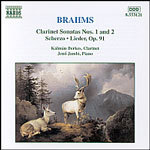
Brahms: Sonatas for Clarinet and Piano
 $25.00
Out of Stock
$25.00
Out of Stock6+ weeks add to cart
JOHANNES BRAHMS
Brahms: Sonatas for Clarinet and Piano
Kalman Berkes (clarinet) / Jeno Jando (piano) (with Tamara Takacs, mezzo-soprano)
[ Naxos / CD ]
Release Date: Thursday 1 July 2004
This item is currently out of stock. It may take 6 or more weeks to obtain from when you place your order as this is a specialist product.
"The engineering is sensational. At the price this label sells for, you can't go wrong"
- Fanfare
Johannes Brahms was born on 7th May 1833 in the Gangeviertel district of Hamburg, the 50n of Johann Jakob Brahms, a double-bass player, and his wife, a seamstress seventeen years his senior. As was natural, he was at first taught music by his father, the violin and cello, with the intention that the boy should follow his father's trade, but his obvious interest in the piano led to lessons on the instrument from an inspiring teacher and his first modest appearance on the concert platform at the age often. From this time onwards he became a pupil of Eduard Marxsen, who gave him a firm grounding in classical technique, while he earned money for his family by playing the piano in establishments of doubtful reputation in the St Pauli district of the port, frequented largely by sailors and others in search of amusement. By the age of fifteen he had given his first 5010 concert as a pianist.
In 1853 Brahms embarked on a concert tour with the Hungarian violinist Eduard
Remenyi, during the course of which he visited Liszt in Weimar, to no effect, and struck up a friendship with the violinist Joseph Joachim, through whose agency he met the Schumanns then established in Dusseldorf. The connection was an important one. Schumann was impressed enough by the music Brahms played him to hail him as the long-awaited successor to Beethoven, and his subsequent break-down in February 1854 and ensuing insanity brought Brahms back to Dusseldorf to help Schumann's wife Clara and her young family. The relationship with Clara Schumann, one of the most distinguished pianists of the time, lasted until her death in 1896.
Further concert activity and his association with Joachim and Clara Schumann allowed Brahms to meet many of the most famous musicians of the day. In 1857 he took a temporary position at the court of Detmold as a conductor and piano teacher, duties that he briefly resumed again in the following two years, continuing all the time his activity as a composer and spending much of his time in Hamburg, where his ambitions were always to centre.
Brahms first visited Vienna in 1862, giving concerts there and meeting during the course of the winter the critic Eduard Hanslick, who was to prove a doughty champion. The following year brought appointment as conductor of the Vienna Singakademie for the season and in 1864 he again spent the winter in the city, a pattern repeated in the following years until he finally took up permanent residence there in 1869. For the rest of his life he remained a citizen of Vienna, travelling often enough to visit friends or to give concerts, and generally spending the summer months in the country, where he might concentrate on composition without undue disturbance. He came in some ways to occupy a position similar to Beethoven in the musical life of the city, his notorious rudeness generally tolerated and his bachelor habits indulged by an admiring circle of friends. He died in Vienna in 1897.
Tracks:
Sonata for Clarinet and Piano in F minor, Op. 120, No. 1
Sonata for Clarinet and Piano in E flat major, Op. 120, No. 2
Sonatensatz: Scherzo (arr. Kalman Berkes)
Lieder, Op. 91 (arr. Kalman Berkes)